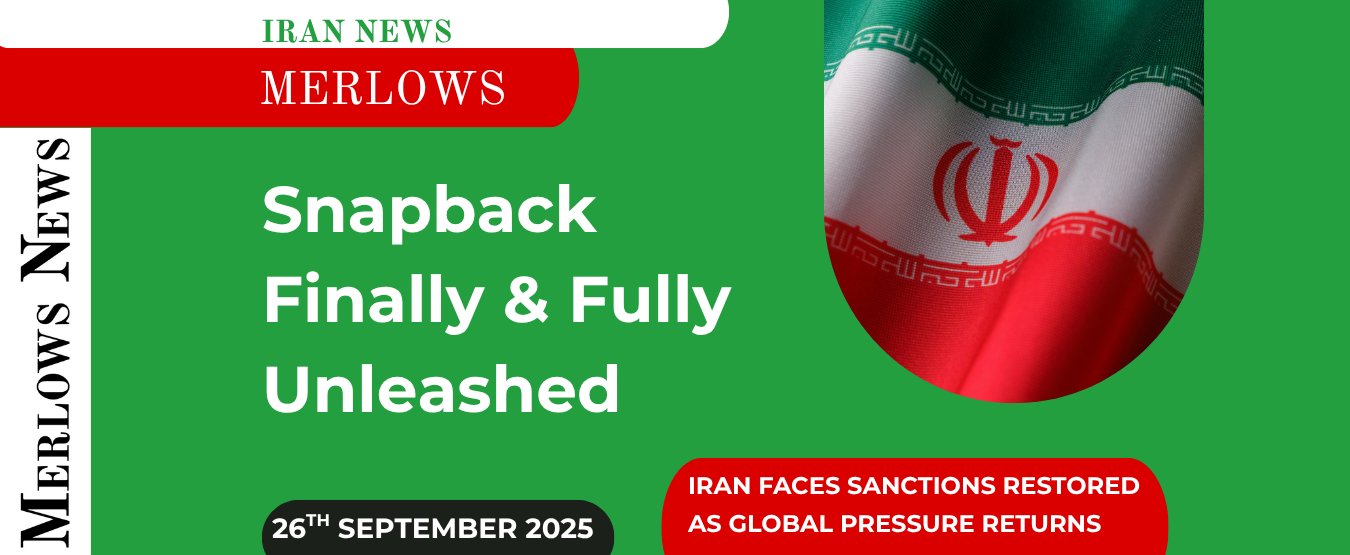After years of watered-down diplomacy, the snapback mechanism has reactivated. Iran now faces the return of sweeping UN sanctions. But will the world enforce them — or watch them crumble like their predecessors?
In a Nutshell
On 26 September 2025, the UN Security Council rejected a last-ditch Russian-Chinese draft resolution to delay the reimposition of sanctions on Iran, enabling the snapback sanctions to take effect. At midnight GMT, the sanctions lifted under the 2015 JCPOA were automatically reimposed. These include a conventional arms embargo, asset freezes, banking restrictions, bans on missile technology, and export controls.
Iran, furious, declared the move “legally void” and warned it would terminate its cooperation with the International Atomic Energy Agency (IAEA). Foreign Minister Abbas Araghchi said the agreement with the IAEA would remain only so long as no hostile actions — including snapback — were taken. Reuters
The sanctions return signals a new phase of confrontation. The world must now choose: enforce or pretend.
The Main Course
The Snapback Mechanism and Its Revival
The 2015 JCPOA included a unique provision — snapback, enshrined in UN Security Council Resolution 2231 — that allows signatories to unilaterally restore previously lifted sanctions if Iran is deemed in “significant non-performance.”
On 28 August 2025, the E3 (UK, France, Germany) formally initiated the snapback process, citing Iran’s violations — accumulation of highly enriched uranium, diminished cooperation with the IAEA, and missile developments.
By 26 September, the Security Council voted 9–4 against a delay resolution proposed by Russia and China. With no vote to continue sanctions relief, the old sanctions snapped back automatically at 00:00 GMT.
What Sanctions Return?
The sanctions reimposed under snapback include:
-
Conventional arms embargo — no sale of weapons or military equipment to Iran
-
Restrictions on missile and ballistic rocket technology, and dual-use goods
-
Asset freezes on Iranian banks, entities tied to the nuclear program, and affiliated individuals
-
Travel bans on officials involved in nuclear, missile, or arms projects
-
Restrictions on exports or imports supporting nuclear and missile development, as well as technology and advanced materials
-
Banking and financial sanctions, including restrictions on access to international financial systems and correspondent banking networks
In short: the full suite of UN sanctions that were lifted in 2015 is back at least on paper.
Iran’s Reaction: Threats, Withdrawal, Retaliation
Iran’s leadership responded with fury. Foreign Minister Araghchi stated that the IAEA agreement is contingent on no hostile actions implicitly threatening to terminate inspections if the snapback proceeds
President Masoud Pezeshkian vowed that Iran will overcome the renewed sanctions, describing them as attempts to block “the road” while the people think and act.
Iran also recalled ambassadors from the UK, France, and Germany for consultations and warned the snapback move undermines diplomacy.
Analysts expect Iran to resume more aggressive enrichment, limit IAEA access, expand its missile program, and possibly escalate proxy conflict in the region.
Impact: Economic, Social, Regional
Iran is already in deep economic crisis. Its currency, the rial, is at historic lows. Food prices have soared, making basics unaffordable for many.
The sanctions will further restrict oil exports, choke banking operations, discourage foreign investment, and make imports more expensive. The general population will bear the cost.
Politically, the regime must reckon with backlash. Hardliners will gain influence, dissent will be crushed, and the façade of moderation will fade.
Regionally, tensions may spike. Israel will watch closely as Iran’s capacity to fund proxies like Hezbollah or the Houthis may be constrained or respond with desperate aggression.
The Media Recommends
-
Reuters: “EU confirms it has reinstated sanctions against Iran.” Reuters
-
AP News: “UN Security Council rejects Russia & China’s delay bid.” AP News
-
Reuters: “E3 to continue pursuing diplomatic channels on Iran.” Reuters
-
Reuters: “Pezeshkian says Iran can overcome any return of sanctions.” Reuters
Media coverage emphasizes the snapback mechanism, diplomatic disputes, and Iran’s stark warnings. What much of the press misses is the past pattern: snapback is not new. It has been threatened many times before — but enforcement has always been flawed.
The Merlow View
History of Weak Enforcement
Snapback is not magic. It is legal on paper, but in practice depends on compliance by nations, enforcement by global actors, and will from powerful states. Previous “snapbacks” have failed when China, Russia, or others continued to trade with Iran.
The fantasy is that sanctions alone can compel regime change. The reality is that Iran is resilient. It has survived decades of sanctions. Unless enforcement is rigorous, sanctions will be circumvented or quietly ignored.
Hypocrisy in Enforcement
Western governments will cheer snapback while quietly tolerating violations, allowing their own energy or shipping interests to slip through loopholes. China and Russia will defy them. Iran will denounce them. The regime may plunge the country deeper into misery — and blame the world, masking its own failures.
Strategic Implications
Iran knows that sanctions bite the people more than the elite. But in desperation, the regime may gamble on escalation more missile tests, supply to proxies, or threats to shipping lanes.
Israel, in particular, may see this as a window to press further on Iran’s vulnerable nuclear sites or proxy networks. The game of deterrence will intensify.
This moment demands more than moral posturing. It demands enforcement, persistence, and legitimacy.
Sanctions are not tools unless backed by action. If a regime can survive snapback on paper, it will. The invitation is to watch not as passive observers, but as analysts. Demand that snapback not be a headline but a turning point. Demand that enforcement, not applause, becomes the measure of strength.
Because when sanctions return, they can either bind Iran or expose the weakness of the world that pronounces them.







Share this: